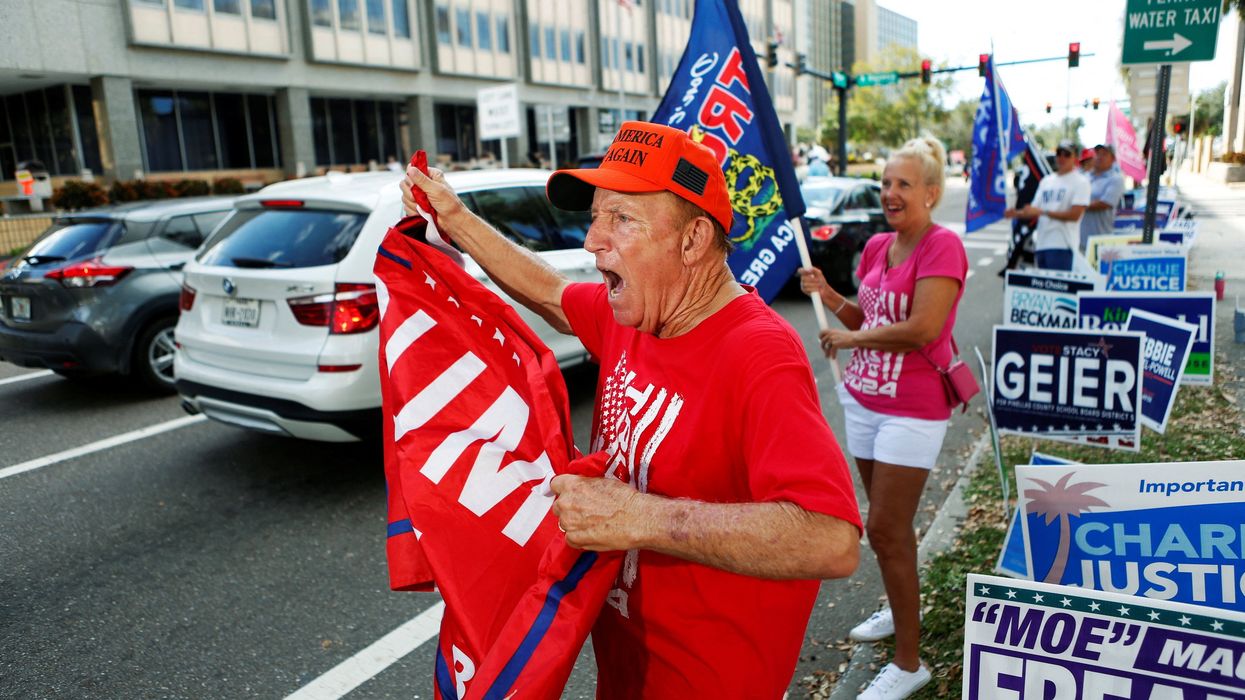
A supporter of Donald Trump rallies outside an early polling precinct as voters cast their ballots in local, state, and national elections, in Clearwater, Florida, U.S., November 3, 2024. REUTERS/Octavio Jones
January 02, 2025
ALTERNET
I just had a chat with an ATT office manager, a young Black man who is very attentive to his customers. After he learned that I worked with labor unions, he said, “I’ve always wanted to be in a union. My dad was a bus driver, and his earnings and benefits really took care of us. Our healthcare was amazing, $5 co-pay and that was it, no matter what the medical procedure.”
His comments both made me sad and angry. He took me back a few decades, when working people still earned a decent living. That’s the period before runaway inequality and job destruction basically wiped out the American Dream for the working class.
It’s not like we can’t afford to pay people decently. The money is there and then some. In 1980, there were 13 billionaires in the U.S. In 2023 there were 801. The top one-tenth of 1% saw their collective wealth jump from $1.8 trillion in 1990, to $22.1 trillion in 2024. For some context, the U.S. federal budget in 2024 was $6.8 trillion. Or consider that there are 1975,00 bus drivers in the U.S. One trillion dollars could pay them $100,000 a year for 57 years.
Have the Democrats learned anything from Trump’s ascendency? The jury is out. Will they actually take on the financial barons? Or will they continue to take in the money that flows so strongly from Wall Street and Silicon Valley?
Meanwhile the average income after inflation of the average worker did not rise at all from 1980 to 2024. And as we all know, during that time healthcare costs have gone through the roof for nearly all of us.
To add to working-class misery there is never ending job insecurity. One in four employed workers fear they will lose their jobs within the next year, according to polling done by Colorado State University.
And there’s a very powerful connection between job loss and enriching the super-rich. In many, if not most, cases, mass layoffs are used to free up cash for companies to pour into stock buybacks—buying back the corporation’s own shares to artificially boost its price. This moves money into the pockets of the largest Wall Street stock-sellers and the companies’ CEOs, who are mostly paid with stock incentives. In a very real way workers are sacrificing their jobs to enrich the richest of the rich. (To see why mass layoffs have little or nothing to do with AI and other new technologies please see my book, Wall Street’s War on Workers.)
In our capitalist economy there has always been a fierce struggle between corporate power and worker power. But when unions represented 25-35% of the private sector, during the post-WWII era, working people had sufficient clout, like that bus driver dad, to provide a good standard of living for their families. Today, with only 6% of the private sector workforce represented by labor unions, the balance has shifted strongly toward corporate power, and wages, benefits, and job security have gone backward.
The power imbalance is so great that our conventional wisdom has changed. Our minds have been warped by corporate power. When unions were strong, runaway inequality was viewed as out and out greed. Today, we are told it’s just the result of entrepreneurial brilliance, that we all benefit from the creation of more and more billionaires, that those left behind simply lack the skills to succeed in our modern economy.
But that bus driver still drives a bus, taking people to work and the doctor or shopping, using much the same skills as generations ago. The difference today is that instead of earning a living wage, as the bus driver once did, workers don’t have sufficient power to gain a decent standard of living. Relegated to gig work or jobs under threat of layoffs, the system is rigged against them.
Historically, working people saw the Democratic Party as the defender of the working-class. Not so today. Instead, they see politicians of both parties as just another group of elites feathering their own nests and protecting the establishment. Very few representatives are seen as willing to take on Wall Street and stop needless mass layoffs, because apart from some occasional rhetoric we don’t see politicians fighting for workers.
The frustration, the resentment, the anger about the rigged system was building long before Donald Trump came on the scene. But there he is, a giant wrecking ball, slamming away at the established order. For those left behind, smashing the establishment feels long overdue.
Have the Democrats learned anything from Trump’s ascendency? The jury is out. Will they actually take on the financial barons? Or will they continue to take in the money that flows so strongly from Wall Street and Silicon Valley?
Looking at the Democrats’ post-election discussions, it could be a long wait until our ATT union-supporter gets a chance to join a union.
Let’s try to have a happy new year, but it is likely to be a tough one for the working class.

No comments:
Post a Comment